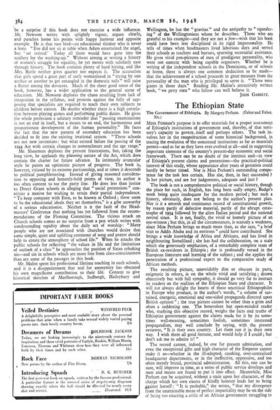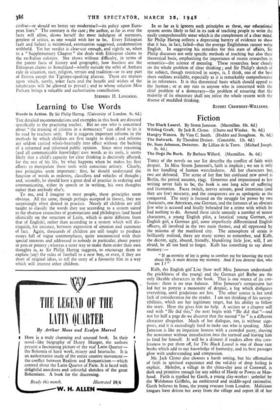The Ethiopian State
MISS PERHAM'S purpose is to offer materials for a proper assessment of Ethiopia's institutions of government and, thereby, of that terri- tory's capacity to govern, itself and perhaps others. The task in- volves her in the recoftruction of some historical background, in tracing the evolution of -the concerned institutions as far as materials permit—and as far as they have ever evolved at all—and in suggesting important elements of the country's present-day economic and social framework. There can be no doubt of the intrinsic and—in view of Ethiopia's present claims and pretensions—the practical-political interest of this study, whose appearance after years of gestation could hardly be better timed. Nor is Miss Perham's outstanding compe- tence for the task less certain. Has she, then, in fact succeeded ? Is her picture, and are her judgements, adequate and just ?
The book is not a comprehensive political or social history, though the place for such, in English, has long been sadly .empty, Budge's work being quite inadequate for the modern period ; but such a history, obviously, does not belong to the author's present plan. Nor is it a smooth and continuous record of constitutional growth, by reason partly of defective material, partly of the abrupt catas- trophe of 1934 followed by the alien Italian period and the national revival since. It is note finally, the vivid or homely picture of an eye-witness ; but this, in all the circumstances is scarcely a weakness, since Miss Perham brings so much more than, as she says, "a brief visit to Addis Ababa and its environs" could have contributed. She brings a wide knowledge of Africa and Africans, and has lived in neighbouring Somaliland • she has had the collaboration, on a scale which she generously emphasises, of a remarkably complete team of British ex-residents in Ethiopia; - she is profoundly versed in the European literature and learning of the subject ; and she applies the penetration of a professional expert to the comparative study of African methods.
The resulting picture, unavoidably dim or obscure in parts, enigmatic in others is on the whole vivid and satisfying ; drawn objectively but with full sympathy, it should go very far to instruct its readers on the realities of the Ethiopian State and character. It will not always delight the hearts of those uncritical Ethiopophiles in Europe who produce in the author's words, "a volume of sus- tained, energetic, emotional and one-sided propaganda directed upon British opinion " ; the true picture cannot be other than a grim and often a saddening one. The benevolent but open-minded reader who, studying this objective record; weighs the facts and truths of Ethiopian government against the claims made for it by its some- times well-meaning, sometimes foolish, sometimes interested propagandists, may well conclude by saying, with the present reviewer, "It is their own country. Let them run it in their own way. I wish them all good fortune, and would help if I could ; but don't ask me to admire it! "
The record cannot, indeed, be one for present admiration, and even the exceptional gifts and high character of the Emperor cannot make it so—whether in the ill-adapted, creaking, over-centralised headquarter departments, or in the ineffective, oppressive, and too often merely brutal, provincial administration. All this, one can be sure, will improve in time, as a sense of public service develops and men and means are found to put it into effect. Meanwhile, Miss Perham can be acquitted, without a stain upon her character, of the charge which her own excess of kindly honesty leads her to bring against herself: • "It is probable,". she writes, "that my divergence from the unattainable mean of perfect impartiality may be on the side of being too exacting a critic of an African government struggling to
civilise—or should we better say modernise?—its policy upon Euro- pean lines." The contrary is the case ; the author, as far as ever the facts will allow, shows herself the most indulgent of narrators, gentlest of critics, as one would wish her to be, Every Ethiopian fault and failure is minimised, extenuation suggested, condemnation withheld. Yet her verdict is clear-cut enough, and rightly so, when in a "Supplementary chapter" she deals with Ethiopian claims to the ex-Italian colonies. She shows without difficulty, in terms of the patent facts of history and geography, how baseless are the Ethiopian claims to Somaliland—wholly outside the orbit of Amhara rule in situation, race, religion, terrain and tradition—or to any part of Eritrea except the Tigrinya-speaking plateau. These are matters upon which, surely, sober facts and the benefit and wishes of the inhabitants will be allowed to prevail ; and to whose solution Miss Perham brings a valuable and authoritative contribution.
STEPHEN H. LONGRIGG.



































 Previous page
Previous page